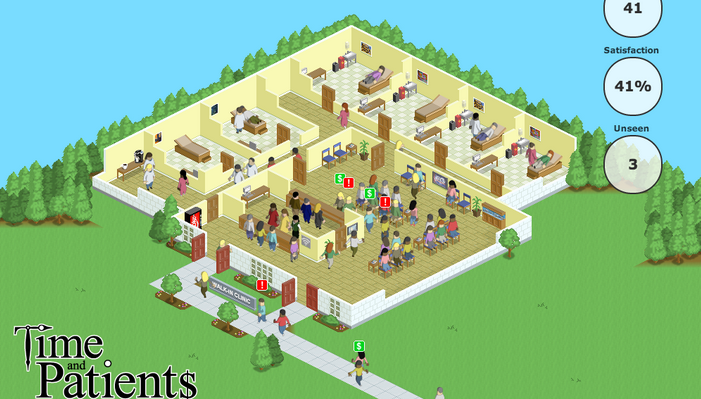Chris Stubbs believes neither a generation of digital natives nor the sheer popularity of gaming should be cited in an argument for the involvement of gaming in education. There’s something bigger happening here.
Thursday night at Wharton’s Huntsman Hall – in a presentation hosted by the Philadelphia Area New Media Association, – he instead made the case for gaming as a playing field where students can practice classroom concepts, experiment, fail and gain feedback that leads to a sense of progression, unshackled
from the pass/fail constraints of traditional testing.
Stubbs is the project manager at the Educational Gaming Commons (ECG) at Penn State, where developers and designers are collaborating with professors to create games like Economics University – a management simulation video game that tasks students with building and running their own college – forcing them to gain experience making difficult choices.
Think of it as Rollercoaster Tycoon with a Ph.D.

Chris Stubbs is the project manager at the Educational Gaming Commons (ECG) at Penn State. Photo courtesy of PANMA
Students earn badges for ‘keeping costs down’ or ‘campus happiness’, but there’s no right or wrong achievement. For example, there’s a ‘money to burn’ badge for building the most expensive building on campus. It’s difficult to earn the merit badges without collecting a few scars along the way.
“There are red herrings that pit your own desires for your college against rational economic choices. Then other times your federal funding gets cut,” Stubbs says, noting that pupils who earn even one badge see an average three percent bump in their class grade. “Students can look back on their decisions and say ‘I remember when my university started bleeding money because I made the wrong choice.’”
ECG was conceptualized as early as 2006 and was showing movement as early as spring 2008, as noted in the below update video. Now, there’s real data on how gaming can shape the learning experience.
The EGC’s user-centric development process focuses first and foremost on talking with professors and students to understand their struggles with the course.
“When we talked to professors of Econ 102, they told us ‘we want to unleash practical economic thinkers,’” says Stubbs, who says the EGC is happy to share their code with anyone interested in using the technology on foreign campuses, though they need to use their own servers.
“We’ve indoctrinated ourselves into this mantra: does it benefit the learner first?”
The EGC enables professors to easily adjust the game on student feedback by running the games through a highly flexible, HTML5 based game creation engine – called the FLAG Engine – which makes game details variable. If a professor decides students should pay $30k for a new building instead of $25k, they can make the change without touching any code.
 “We can make small changes in six minutes that used to take a week,” says Stubbs. “Before, we had to ask developers to add-in each new content piece.”
“We can make small changes in six minutes that used to take a week,” says Stubbs. “Before, we had to ask developers to add-in each new content piece.”
The FLAG Engine’s flexibility means the EGC can take EconU, morph school buildings into hospitals, and roll out a new game on the same platform called ‘Time and Patients’ for health sciences students. Due out this summer in collaboration with Penn State’s department of Health Policy Administration, the game puts users as the head of a walk-in clinic and forces them to ‘make tough decisions around a number of different factors, including staffing, amenities and overall policies in order to keep the clinic afloat.’
- According to data collected by the EGC, students at the B- to B+ level make the most efficient use of these situational games.
- Students who are struggling the most see the most benefit, but they also spend the most time playing.
- Straight A students enjoy the games, but they play for the lowest amount of time, usually experimenting and testing theories they would never have the luxury of exploring on the test.
The engine captures analytical data on user behavior by saving an XML file after every decision. “It’s a lot of data to analyze,” said Stubbs. “So far, we can tell students just do what they want the first two times without watching the tutorial and applying classroom concepts. Then the third time they get a little more cautious.”
Ideally, the opportunity to experiment, fail and grow will help more fully developed students make better decisions once they graduate.
Please continue the conversation in the comments section.
- Do you see the benefits of students using video games to ‘learn by doing’? What back draws do you see?
- Do you know of any colleges or high schools in the area using similar methods?
- Do have any ideas for enacting these methods in our region?
Slides from the event are available at the Philadelphia Area New Media Association website.
Before you go...
Please consider supporting Technical.ly to keep our independent journalism strong. Unlike most business-focused media outlets, we don’t have a paywall. Instead, we count on your personal and organizational support.
Join our growing Slack community
Join 5,000 tech professionals and entrepreneurs in our community Slack today!

The person charged in the UnitedHealthcare CEO shooting had a ton of tech connections

From rejection to innovation: How I built a tool to beat AI hiring algorithms at their own game

How a laid-off AI enthusiast pivoted to become a founder — while holding down a day job

